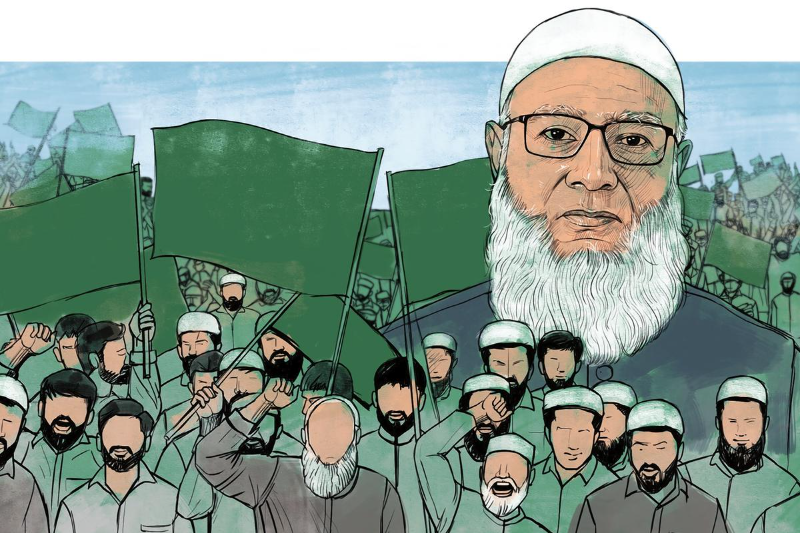
the rise of jamaat e islami a threat to bangladesh and beyond
Last updated on September 1st, 2024 at 03:13 pm
The crisis deals with the sudden resignation of Prime Minister Sheikh Hasina and the growth in power by an Islamic group that goes by the name Jamaat-e-Islami. This shift in governance could be damaging to Bangladesh’s image with the rest of the world and pose complications for its neighbor, India. Let’s explore why this would happen and what it could entail.
Who is Jamaat-e-Islami?
Jamaat-e-Islami is a political party in Bangladesh that seeks to align the country in accordance with stern Islamic jurisprudence. They do not believe in the separation of religion from government. This goes against the very founding idea of Bangladesh as a country where all religions are accorded equal status. The Jamaat-e-Islami has a violent past, especially during the fight for independence by Bangladesh in 1971. They have been accused of harming people who disagreed with them, in particular Hindus and other religious minorities.
The Threat to Bangladesh’s Democracy
The rise of Jamaat-e-Islami is an omen for Bangladesh’s democracy. Here’s why:
1. They want the country’s laws changed to make them compatible and concomitant with their rigid religious convictions. This, if ever achieved, would deny many of the freedoms presently enjoyed by people in Bangladesh.
2. They do not agree with all religious groups having equal rights. That could worsen the persecution against non-Muslims even more.
3. The record of violence scares the living daylights out of many people. It may be that fear which will prevent the people from coming forward or joining politics at all.
That is to say, with more power for Jamaat-e-Islami, Bangladesh might head in a direction that is opposite to being a tolerant place for a variety of thoughts and opinions. It would then snuff out years of progress that the country has made.
Related Posts
Threat to Religious Minorities
One of the major fears about the rise of Jamaat-e-Islami is that it will be a threat to religious minorities, especially Hindus. In the past, when Jamaat-e-Islami garnered too much power and influence, they resorted to attacks on the Hindu community. They vandalized temples and houses. Most of the Hindus in Bangladesh are visibly concerned about their security. According to them, with the rise of Jamaat-e-Islami, the cases of violence against them will also increase.
Problems for India
But India also has its concerns regarding these changes-the big neighbour of Bangladesh. Why? Here’s why:
1. Jamaat-e-Islami doesn’t like India. If they gain power, they might try to cause problems between the two countries.
2. There’s a long border between India and Bangladesh. If Bangladesh becomes less stable, that may lead to security issues for India, such as illegal border crossing or spread of radical ideas.
3. If Hindus in Bangladesh feel that their lives are in danger, many of them will try to cross over into India. That will create a social and economic problem for India.
India seeks a stable, peaceful Bangladesh. The emergence of Jamaat-e-Islami creates a dent in that stability.
Bangladesh’s Standing in the World
Bangladesh has been the success story of the world in the last decade. While its economy was growing progressively, it was gaining its importance in the world. The emergence of Jamaat-e-Islami may turn the tables completely around for Bangladesh:
1. Very few countries would prefer business dealings or extend aid to a nation governed by an extremist organization.
2. Bangladesh may also be robbed of its reputation as a moderate Muslim-majority country.
3. There would likely be less foreign investment, which could hurt Bangladesh’s economy.
4. Other countries might put pressure upon Bangladesh or even impose sanctions if human rights are threatened.
All these could isolate Bangladesh from the international community.
The rise of Jamaat-e-Islami in Bangladesh is a cause of grave concern-an obstacle to the country’s democracy, a threat to minorities in the country, a nightmare to bordering countries like India, and dangerous to the position of Bangladesh among the comity of nations. It is now time for the people of Bangladesh and those around the world who understand these risks to come together and stand for the progress of Bangladesh. Over the coming months, the course that the country should ideally take needs to be chalked out.









